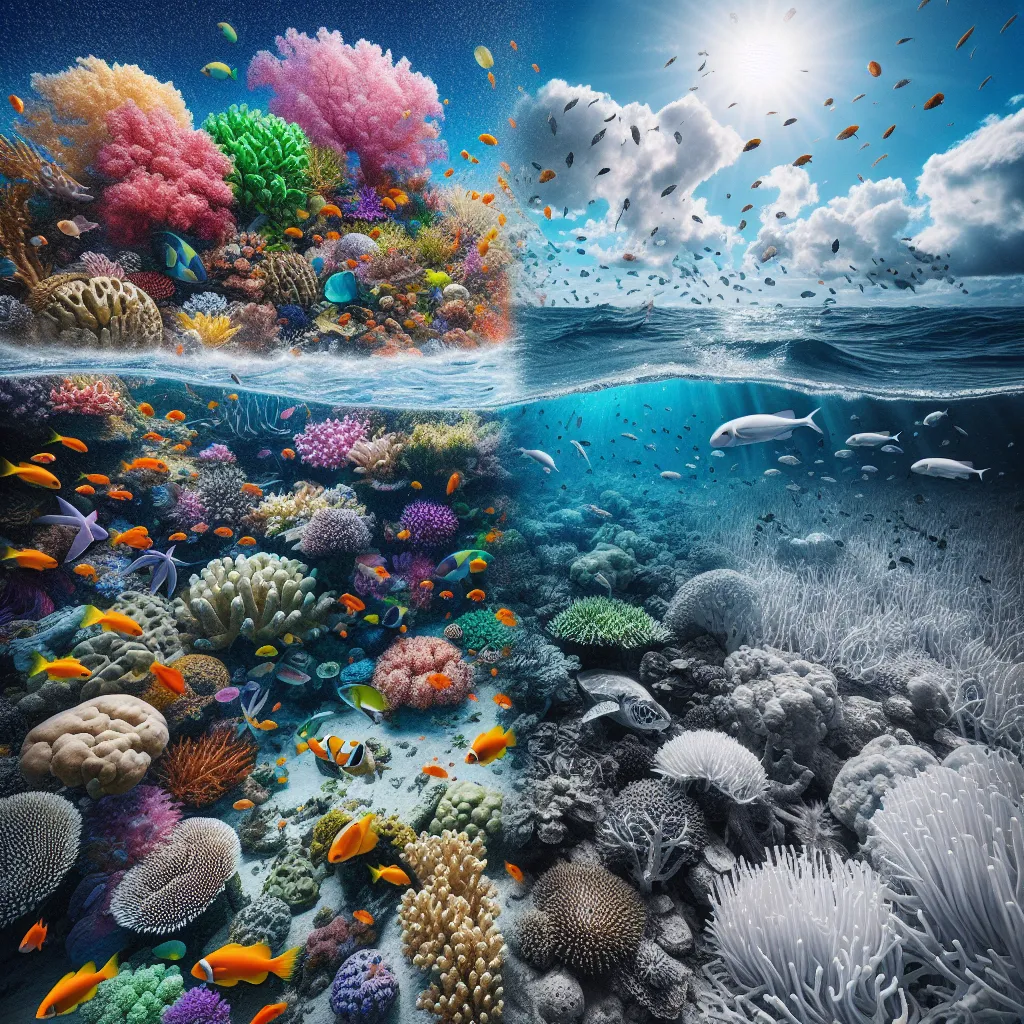Welcome to our IELTS Reading practice session focused on “The Effects of Climate Change on Coral Reefs.” This topic is not only crucial for environmental awareness but also frequently appears in IELTS exams. Let’s dive into a comprehensive reading exercise that will help you improve your skills and prepare for the IELTS Reading test.
 Coral reef affected by climate change
Coral reef affected by climate change
Introduction to the IELTS Reading Test
The IELTS Reading test consists of three passages of increasing difficulty. Today, we’ll practice with texts related to climate change and its impact on coral reefs. Remember, you’ll have 60 minutes to complete all three sections in the actual test. Let’s begin with our practice passages.
Passage 1 – Easy Text
The Importance of Coral Reefs
Coral reefs are often called the “rainforests of the sea” due to their incredible biodiversity and ecological importance. These complex ecosystems support a vast array of marine life, providing food and shelter for numerous species. Moreover, coral reefs play a crucial role in coastal protection, acting as natural barriers against storms and erosion. They also contribute significantly to the global economy through fishing and tourism industries.
However, these vital ecosystems face an unprecedented threat from climate change. As global temperatures rise, coral reefs are experiencing severe stress, leading to widespread bleaching events and potential collapse of entire reef systems. Understanding the effects of climate change on coral reefs is essential for developing strategies to protect these irreplaceable natural wonders.
Questions 1-5
Do the following statements agree with the information given in the passage? Write
TRUE if the statement agrees with the information
FALSE if the statement contradicts the information
NOT GIVEN if there is no information on this
- Coral reefs are sometimes referred to as the “rainforests of the sea.”
- Coral reefs only provide shelter for a small number of marine species.
- Coral reefs help protect coastal areas from storms and erosion.
- The fishing industry does not benefit from coral reefs.
- Climate change is causing stress to coral reef ecosystems.
Questions 6-10
Complete the sentences below. Choose NO MORE THAN TWO WORDS from the passage for each answer.
- Coral reefs are important for their __ and ecological significance.
- These ecosystems provide food and shelter for many __.
- Coral reefs contribute to the global economy through fishing and __ industries.
- Rising global temperatures are causing severe __ to coral reefs.
- Climate change may lead to the __ of entire reef systems.
Passage 2 – Medium Text
Climate Change and Coral Bleaching
The most visible and immediate effect of climate change on coral reefs is the phenomenon known as coral bleaching. This occurs when water temperatures rise above the coral’s tolerance level, causing them to expel the symbiotic algae living in their tissues. These algae, called zooxanthellae, provide corals with essential nutrients and their vibrant colors. Without them, corals appear white or “bleached” and are at high risk of starvation and disease.
Recent years have seen an alarming increase in the frequency and severity of bleaching events. The Great Barrier Reef, the world’s largest coral reef system, experienced consecutive mass bleaching events in 2016 and 2017, affecting vast areas of the reef. Scientists warn that if global temperatures continue to rise at the current rate, we may lose up to 90% of the world’s coral reefs by 2050.
In addition to bleaching, climate change affects coral reefs through ocean acidification. As the oceans absorb more carbon dioxide from the atmosphere, seawater becomes more acidic. This change in ocean chemistry makes it difficult for corals and other marine organisms to build their calcium carbonate skeletons, weakening the entire reef structure.
The loss of coral reefs would have devastating consequences for marine biodiversity and human communities that depend on these ecosystems for food, income, and coastal protection. It’s crucial to implement immediate and effective measures to mitigate climate change and protect these vital marine habitats.
Questions 11-14
Choose the correct letter, A, B, C, or D.
-
What causes coral bleaching?
A) Pollution in the oceans
B) Overfishing
C) Increased water temperatures
D) Ocean acidification -
Zooxanthellae are:
A) A type of coral
B) Symbiotic algae living in coral tissues
C) A disease affecting corals
D) Marine scientists studying coral reefs -
The Great Barrier Reef experienced mass bleaching events in:
A) 2015 and 2016
B) 2016 and 2017
C) 2017 and 2018
D) 2018 and 2019 -
According to scientists, what percentage of coral reefs might be lost by 2050 if current trends continue?
A) 50%
B) 70%
C) 80%
D) 90%
Questions 15-19
Complete the summary below. Choose NO MORE THAN TWO WORDS from the passage for each answer.
Climate change affects coral reefs in multiple ways. The most visible impact is coral bleaching, caused by rising (15) __. This leads corals to expel their (16) __, leaving them vulnerable to starvation and disease. Another significant threat is (17) __, which occurs as oceans absorb more carbon dioxide. This process makes it harder for corals to build their (18) __. The potential loss of coral reefs would have severe consequences for marine biodiversity and (19) __ that rely on these ecosystems.
Passage 3 – Hard Text
Adaptive Strategies and Conservation Efforts
While the threats facing coral reefs are severe, scientists and conservationists are working tirelessly to develop strategies to protect and restore these crucial ecosystems. One promising approach involves identifying and propagating heat-resistant coral species. Some corals have shown remarkable resilience to increased temperatures, and researchers are studying these “super corals” to understand the genetic basis of their thermal tolerance.
Another innovative technique is assisted evolution, where scientists attempt to accelerate the natural adaptation process of corals. This involves exposing coral larvae to higher temperatures and selecting for heat-tolerant individuals. While controversial, proponents argue that such interventions may be necessary given the rapid pace of climate change.
Coral restoration projects are also gaining traction worldwide. These initiatives involve growing coral fragments in nurseries and transplanting them onto degraded reefs. While labor-intensive, such efforts have shown promising results in restoring reef ecosystems and enhancing their resilience to climate stressors.
However, these adaptive strategies and conservation efforts, while crucial, are not sufficient on their own. Addressing the root cause of coral reef decline – global climate change – remains paramount. This requires concerted action at local, national, and international levels to reduce greenhouse gas emissions and limit global temperature rise.
Moreover, integrated coastal management approaches are essential for protecting coral reefs. This includes reducing local stressors such as overfishing, pollution, and coastal development. By minimizing these additional pressures, reefs may have a better chance of withstanding the impacts of climate change.
The fate of coral reefs hangs in the balance, and their survival will depend on our ability to implement effective conservation strategies while simultaneously addressing the broader challenge of climate change. The loss of these ecosystems would be an ecological tragedy with far-reaching consequences for biodiversity and human well-being. However, with concerted effort and innovative approaches, there is still hope for the future of coral reefs in a changing world.
Questions 20-24
Choose FIVE letters, A-H.
Which FIVE of the following strategies or approaches are mentioned in the passage as ways to protect and restore coral reefs?
A) Identifying heat-resistant coral species
B) Introducing new predator species to control reef ecosystems
C) Assisted evolution of corals
D) Coral restoration projects
E) Increasing fishing quotas in reef areas
F) Reducing greenhouse gas emissions
G) Integrated coastal management
H) Building artificial reefs using plastic materials
Questions 25-28
Complete the sentences below. Choose NO MORE THAN TWO WORDS from the passage for each answer.
- Scientists are studying “super corals” to understand their __ to increased temperatures.
- Assisted evolution involves exposing coral __ to higher temperatures.
- Coral restoration projects grow coral fragments in __ before transplanting them.
- Integrated coastal management aims to reduce local stressors such as overfishing and __.
Questions 29-40
Do the following statements agree with the claims of the writer in the passage? Write
YES if the statement agrees with the claims of the writer
NO if the statement contradicts the claims of the writer
NOT GIVEN if it is impossible to say what the writer thinks about this
- Heat-resistant coral species offer a potential solution to the challenges faced by coral reefs.
- Assisted evolution of corals is universally accepted as the best approach to coral conservation.
- Coral restoration projects have been unsuccessful in restoring reef ecosystems.
- Addressing global climate change is more important than local conservation efforts.
- Reducing greenhouse gas emissions is necessary to protect coral reefs in the long term.
- Overfishing has no significant impact on coral reef health.
- The loss of coral reefs would only affect marine ecosystems.
- There is no hope for the survival of coral reefs in the face of climate change.
- Genetic research on corals is not a priority in conservation efforts.
- Local communities play no role in coral reef conservation.
- Artificial reefs can completely replace natural coral reef ecosystems.
- The survival of coral reefs depends on a combination of conservation strategies and climate action.
Answer Key
Passage 1
- TRUE
- FALSE
- TRUE
- FALSE
- TRUE
- biodiversity
- species
- tourism
- stress
- collapse
Passage 2
- C
- B
- B
- D
- water temperatures
- symbiotic algae
- ocean acidification
- calcium carbonate skeletons
- human communities
Passage 3
20-24. A, C, D, F, G
25. thermal tolerance
26. larvae
27. nurseries
28. pollution
29. YES
30. NOT GIVEN
31. NO
32. NO
33. YES
34. NO
35. NO
36. NO
37. NOT GIVEN
38. NOT GIVEN
39. NO
40. YES
Conclusion
This IELTS Reading practice session on “The Effects of Climate Change on Coral Reefs” has provided you with valuable experience in tackling various question types while exploring an important environmental topic. Remember to manage your time effectively in the actual test and always refer back to the passage for evidence to support your answers.
For more practice on environmental topics, check out our articles on the impact of climate change on coastal ecosystems and the effects of global warming on marine ecosystems. These resources will help you broaden your knowledge and improve your IELTS Reading skills.
Keep practicing, and good luck with your IELTS preparation!


